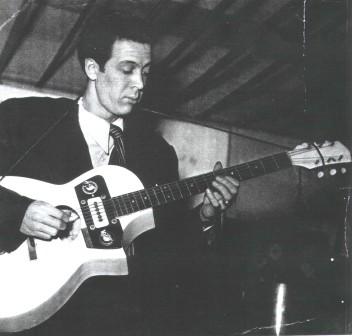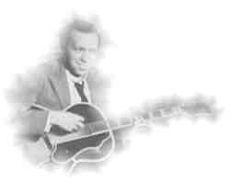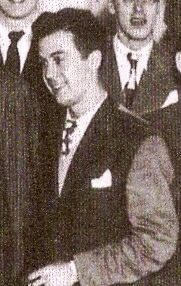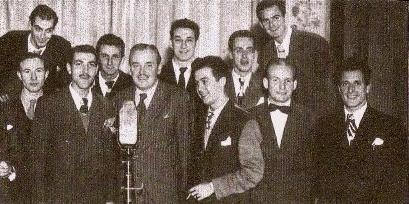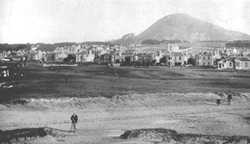Peter William Chilver 1924-2008
Guitarist and Hotelier, born October 19 1924; died March 16 2008
Pete Chilver, who became one of the 1st British-born musicians to establish the electric guitar in this country, died aged 83. The relative shortness of Chilver‘s career has obscured the importance of what he achieved. But he was honing his skills at a time when many of the best young British musicians – among them Ronnie Scott, John Dankworth and George Shearing – were attempting to master the harmonic language of bebop. Deputising with the Ken ‘Snakehips’ Johnson Orchestra at age 15. Playing at American bases during war. Different regimes within adjacent American and British camps. Sunday nights at the Feldman Club. Victor Feldman, Freddy Crump and the Feldman Club (began ca. 1941). Air raids and Police raids. Club 11 (formerly Blue Lagoon), Fullado Club.
1946 TV programme from Alexander Palace featuring Stephane Grappelli. On meeting Grappelli and Reinhardt. He shared a flat with Dave Goldberg which became a Mecca for visiting jazz musicians owing to their extensive record collection. Chilver took Goldberg‘s part in the Ted Heath Band when Goldberg went to work in USA. Prior small group work with Tito Burns.
Pete Chilver he played with Ronnie Scott’s Club Eleven, and was one of the main guitarists for the Ted Heath Big Band. Some of Ted Heath’s music has been re-released on CD so you can probably get to hear him there. Better yet, he played with Trumpeter, Dizzy Reece, and they re-released some of his albums. Peter left the Ted Heath band when Goldberg returned less than a year later. On leaving Heath had residencies with Ambrose at the Nightingale nightclub and later with Ralph Sharon small group at Fisher’s restaurant.
Chilver and his guitarist friend Dave Goldberg used to frequent the Caribbean Club, where Trinidadian guitarist Lauderic Caton encouraged them, built them amplifiers, and let them sit in with the house trio. But before this, at Victor Feldman’s club, at 100 Oxford Street, Chilver had witnessed jam sessions uniting locals with the American members of the Glenn Miller and Sam Donahue bands, and as a result replaced an ailing Carmen Mastren with Miller‘s band on a number of dates elsewhere.
Carmen Mastren 1913-81
By the late 1940s, he was mastering the idiom’s melodic intricacy and speed, and – like Scott and Dankworth – he became one of only a handful of London-based players who could keep up with the American innovators. His work drew praise from such luminaries as Benny Goodman and the Modern Jazz Quartet’s John Lewis. Born in Windsor, Berkshire, Peter Chilver was the youngest of 3 children of a police sergeant and a musical mother. A boy chorister at Windsor Castle, he learned to play the piano before taking up the guitar. After leaving school at 16 in 1940, he formed his own Silver Sovereigns to play weekends at Skindles, the riverside hotel at Maidenhead known as “Soho on Thames”. That same year, he met the Cardiff-born black guitarist Joe Deniz at Feldman‘s, and through this friendship encountered musicians of African descent. George Formby and Django Reinhardt had inspired him initially, but he celebrated jazz as a black creation and could not believe his luck when Deniz asked him to deputise at rehearsals of Ken “Snake Hips” Johnson’s West Indians.
Private recitals in Chilver‘s flat, some involving Django Reinhardt.
Pete knew Django reasonably well, having 1st met him in London. I remember 2 stories he told. One is fairly well documented, and concerns the night Django was visiting the flat on Charing Cross Road which Dad and Dave Goldberg shared at the time. The 3 of them were jamming and generally having a great time, but the noise was upsetting their neighbour. He was a burly fellow who had no love of jazz whatsoever. He banged on the door and shouted at them to “keep that f***ing racket down” Dave Goldberg (who was bigger than Pete) was despatched to the door. He opened it and said to the man, “don’t you realise, that was Django Reinhardt playing?” to which the response was ” I don’t care if it’s the f***ing King playing”. The words vary slightly depending on which account you read, but the gist is accurate. David Chilver
Pianist Ralph Sharon was a near-neighbour and in 1942, while doing war work in adjacent factories – Pete Chilver was a draughtsman – they played together in the Embassy Aces band in Slough, Berkshire. They were spotted by trumpeter Johnny Claes, who engineered their release to tour American military bases. After meeting Chilver in Bristol, the young John Lewis, stationed with the US army prior to the D-day landings, played with the band on several occasions, and 50 years later still remembered “that wonderful guitarist”.
In 1946, Chilver joined singer Ray Ellington and was playing with him at the Bag O’ Nails Club in the West End when Django Reinhardt and Stephane Grappelli sat in. He then worked with accordionist Tito Burns who, together with Ellington, would help to popularise modern jazz in Britain. The following year, Chilver heard his first Charlie Parker disc and was entranced by bebop’s excitement and daring. But while Ronnie Scott and others visited the US for 1st-hand experience, Chilver worked on in London with George Shearing, Jack Jackson and Bert Ambrose and toured with Grappelli. Whenever he could, he played bebop with Sharon and other progressives. At the Charing Cross Road flat he shared with Goldberg and the South African percussionist Jack Meyer, the visitors were legendary; composer Tadd Dameron, Ella Fitzgerald with new husband Ray Brown, and dancers from Harlem’s Apollo theatre all came for sessions. In 1948, with Britain’s leading bandleader, Ted Heath, Chilver reached a teenage audience, but his most prestigious job came the following year, accompanying Benny Goodman at the London Palladium.
The Esquire Five – January 13th, 1948 (Esquire)
Ronnie Scott (ts), Pete Chilver (g), Ralph Sharon (p), Jack Fallon (b), Carlo Krahmer (d).
Melody Maker’s Jazz Rally – June 29th, 1947 (All issued on Columbia)
Dave Wilkins (tp), Woolf Phillips (tb), Harry Parry (cl), Reggie Dare (ts), Ralph Sharon (p), Pete Chilver (g), Jack Fallon (b), Norman Burns (d).
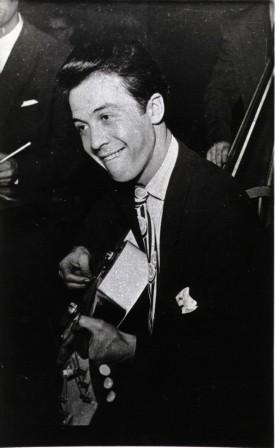
Chilver and Ronnie Scott went AWOL from Ambrose‘s band in order to attend the Salle Pleyel Festival in Paris (1949), featuring Charlie Parker, Miles Davis, Sidney Bechet and others. Django Reinhardt at La Pavilion on the Champs-Elysâee. Parker refused to go and see Django Reinhardt play. On the 15th of May 1949, the series was concluded with a jam, that contained all musicians of the festival on stage: Bill Coleman, Miles Davis, Kenny Dorham, Oran Hot Lips Page, Sidney Bechet, Charlie Parker, Don Byas, James Moody, Al Haig, Tommy Porter, Max Roach and Toots Thielemans
The 2nd Django story is less well known. Along with some other musicians, Pete went to Paris (1949) to see Charlie Parker. On one evening he got talking to Bird and suggested he join him later to go and see Django who was playing in some club. Charlie Parker declined, saying that he had (either earlier that day or the day before) seen a guitar player who had blown his mind–and he couldn’t imagine anyone being better than that. That player was Segovia. Of course , Bird heard Django on future occasions and loved his playing. – David Chilver
Alan Dean’s Beboppers – April 29th, 1949 (Decca)
Ronnie Scott (ts), Johnny Dankworth (as), Reg Arnold (tp), Bernie Fenton (p), Pete Chilver (g), Joe Mudele (b), Laurie Morgan (d), Alan Dean (vocal).
Gone With The Windmill (take 1)*#/Gone With The Windmill (take 2)*/Barbados*/Elevenses*/Ool-Ya-Koo*.
In 1950 he married Norma de Domenico, the sister of Ted Heath‘s singer Lydia MacDonnell, and they moved to North Berwick, Scotland where Chilver managed the family hotel. He went on to run 2 family enterprises in Edinburgh, one of which, the West End Cafe, became Scotland’s major modern jazz venue. (West End Café in Shandwick Place, which was a key venue later in the 50’s decade). Chilver never played professionally again. Norma and his son David survive him.
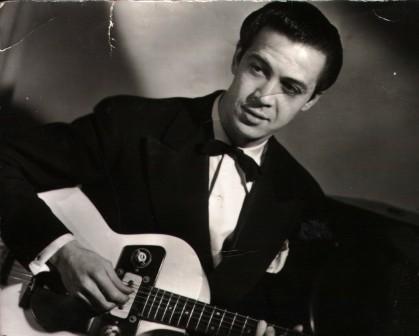
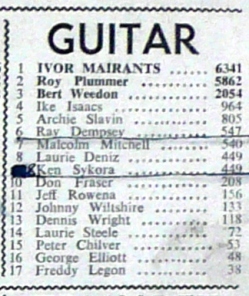 1954 New Musical Express Poll Winners
1954 New Musical Express Poll Winners
Despite his retirement Peter Chilver is still listed
Peter is clearly in his prime during that period 1947-50. The interesting Hybrid Guitar looks like a ‘custom made’ guitar to his own specification – who was the Luthier back then. Pure White or Blonde Finish, Vertically dropped Florentine cutaway, D Shaped Soundhole, Tailpiece out of shot, Bridge mounted in the centre of the lower bout and perhaps a saddle or 2nd pickup next to the soundhole, with main pickup and vol/tone controls mounted on a separate and perhaps removable plate – shades of Leo Fender. Looks like a small scratchplate was present in the bow tie picture. This plate seems to have been removed on the other images. Could that have been a Lauderic Caton Design Special? I hope it is still out there somewhere.
Partly because of the legacy of the West End Cafe–visiting musicians would often call round or be put in touch with Pete (Ronnie Scott would often tell players who were touring in Edinburgh to make contact). These were not just guitarists, and spanned all sorts of styles. I can remember the likes of Joe Bushkin, Lyle Mayes, George Benson, Tal Farlow, and Barney Kessel, to name but a few. He of course was very fond of Martin Taylor and Louis Stewart both of whose playing he loved and who he knew very well. Johnny Smith – I remember him also being a visitor to Edinburgh and the family home.
Melody Maker’s Jazz Rally – June 29th, 1947 (All issued on Columbia)
Dave Wilkins (tp), Woolf Phillips (tb), Harry Parry (cl), Reggie Dare (ts), Ralph Sharon (p), Pete Chilver (g), Jack Fallon (b), Norman Burns (d).
Steve Race Bop Group – August 31st, 1949 (Paxton)
Johnny Dankworth (as), Leon Calvert (tp), Steve Race (p), Pete Chilver (g), Jack Fallon (b), Norman Burns (d).
Vertigo*/Marzipan*/Bugle Call Bop*/Microcosmo*.
(*Jasmine CD – Bop-in’ Britain Vol 1)
Pete Chilver and Joe Pass
Playing–As far a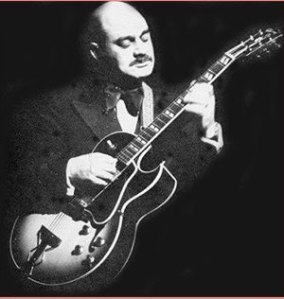 s I know he never played in public after 1950/51. He kept an acoustic guitar at home (a Martin), however, and he would play quite a lot for himself, in the evenings for example. He would also, occasionally, play at home with friends when they visited. I remember, he was a good friend of Joe Pass who would always visit when he was in Scotland. Joe persuaded him to get his guitar out and they played together a few times in the privacy of home. My mother recounts to this day is when he stayed over one evening. She cooked dinner and made a large Lasagne. But it was too much for Pete and Joe to finish. She was going to throw the remains away but Joe said “no–save it for breakfast.” She thought he was joking but put it in the fridge nevertheless. The next morning Joe came down for breakfast and had coffee and a large plate of cold Lasagne which he decreed to be delicious! David Chilver
s I know he never played in public after 1950/51. He kept an acoustic guitar at home (a Martin), however, and he would play quite a lot for himself, in the evenings for example. He would also, occasionally, play at home with friends when they visited. I remember, he was a good friend of Joe Pass who would always visit when he was in Scotland. Joe persuaded him to get his guitar out and they played together a few times in the privacy of home. My mother recounts to this day is when he stayed over one evening. She cooked dinner and made a large Lasagne. But it was too much for Pete and Joe to finish. She was going to throw the remains away but Joe said “no–save it for breakfast.” She thought he was joking but put it in the fridge nevertheless. The next morning Joe came down for breakfast and had coffee and a large plate of cold Lasagne which he decreed to be delicious! David Chilver
Jazz Journal International in the 1970s, launched a regular feature called “Discourse” – a blindfold test for 2 or more practitioners of the same instrument. One of these involved Joe Pass, Louis Stewart and British guitarist Pete Chilver. At the end, I played a track – “Falling In Love With Love” – from Joe‘s 1st recording as leader (Catch Me), made in 1963. I will never forget the response of the 3 musicians. Louis Stewart and Pete Chilver sat in awed silence throughout the number, completely lost in admiration for Pass‘s brilliant improvisational skills. But Joe said, after half a bar, “Oh man, take that off! I hated every minute of making that record. I was uptight, nervous and upset.” He later said, when asked which of his recordings he was happiest with: “None“. Kurt Giese, who produced the programmes, has vivid memories of the 2, five-day collaborations between the NDR Big Band and Joe Pass. He recalls that – true to Joe‘s own admission – the guitarist disliked rehearsing and was always reluctant to make alternate takes of his solo choruses. “But,” says Giese, “he was in very good spirits throughout. At the end of the second session I had a feeling that we were buddies.” Throughout the sessions Joe Pass and the NDR Big Band work well together in what comes across as an atmosphere of mutual respect, despite the limited time they had to get to know each other – always a challenge in these big-band-with-guest-soloist projects. I have a feeling that if Louis Stewart and Pete Chilver get to hear this album in due course, their expressions will be an eloquent flashback to that day in London 20 years ago when I played them the track from “Catch Me“.
BBC SESSION WHEN THE SAINT’S GO MARCHING IN
Melody Maker Columbia Jazz Rally: Reg Arnold, tp; Woolf Phillips, tb; Frank Weir, cl; Ronnie Scott, ts; George Shearing, p; Pete Chilver, g; Jack Fallon, b; Norman Burns, d.
London, June 29, 1947
BLUES IN THIRDS
Alan Dean and his Be-Boppers: Reg Arnold, tp; Johnny Dankworth, as; Ronnie Scott, ts; Bernie Fenton, p; Pete Chilvers, g; Joe Mudele, b; Laurie Morgan. d. Alan Dean (vocal)
London, April 29, 1949
THE WORLD IS WAITING FOR THE SUNRISE
Benny Goodman: BBC Broadcast “Hi, Gang”
Benny Goodman, cl; Buddy Greco, p; Pete Chilver, g; Charlie Short, b; Flash Winston, d.
London, July 21, 1949
Pete Chilver and Lauderic Caton
When, in 1941, the Trinidadian guitarist Lauderic Caton began broadcasting on the BBC with swing clarinettist Harry Parry‘s Benny Goodman-like group, it was the 1st time that the British public had heard an electric guitar played at a UK gig. The impact is hard to imagine now, with the instrument one of the most familiar sounds in music. But back then, amplification had only just begun to give the guitar a powerful solo voice, loud enough to break out of the massed ranks of a jazz band’s brass and reeds.
The brilliant improvising of Charlie Christian was on Caton‘s mind when he arrived in London from Paris in 1940. He bought an amplifier that May, and was soon a focus of attention in West End nightclubs. It was there, while playing at the Caribbean Club in 1944, that he met and transformed the career of Pete Chilver, who became one of the 1st British-born musicians to establish the electric guitar in this country, and has now died aged 83. The relative shortness of Peter Chilver’s career has obscured the importance of what he achieved. But he was honing his skills at a time when many of the best young British musicians – among them Ronnie Scott, John Dankworth and George Shearing – were attempting to master the harmonic language of bebop.
Chilver and his guitarist friend Dave Goldberg used to frequent the Caribbean Club, where Caton encouraged them, built them amplifiers, and let them sit in with the house trio. But before this, at Feldman‘s club, at 100 Oxford Street, Chilver had witnessed jam sessions uniting locals with the American members of the Glenn Miller and Sam Donahue bands, and as a result replaced an ailing Carmen Mastren with Miller’s band on a number of dates elsewhere. By the late 1940s, he was mastering the idiom’s melodic intricacy and speed, and – like Scott and Dankworth – he became one of only a handful of London-based players who could keep up with the American innovators. His work drew praise from such luminaries as Benny Goodman and the Modern Jazz Quartet’s John Lewis.
- Peter William Chilver, guitarist and hotelier, born October 19 1924; died March 16 2008
In terms of his musical tastes, Peter listened to all sorts of things. I remember in the early 1960s he was very early in getting into Indian music (he loved Ravi Shankar) and Brazilian music (Joao Gilberto in particular). He also loved classical music (he and his close friend, the recently departed Jack Parnell, would exchange tapes or cd’s of classical performances, just as often as jazz ones). In terms of modern guitar players, I think the last concerts he went to were by Ulf Wakenius and Kurt Rosenwinkel respectively, both of who he loved. He was also a fan of John Scofield, Bill Frisell, Larry Koonse and Anthony Wilson. Of the earlier generations he particularly enjoyed Pat Martino, Jimmy Raney and Lenny Breau. – David Chilver
The British Library – Oral History of Jazz in Britain
Pete Chilver Oral History Abstracts
– Andy Simons
Born in Windsor, 1924. Family background and 1st experience with ukulele, then guitar (age 14). Influence of George Formby (initially), then Django Reinhardt records. Other influences: saxophonist Pete Brown, Charlie Christian, Eddie Lang and others. Limited availability of records in 1930s. At age 17 met Ralph Sharon and explored music together, merging their bands into one. At age 21 acquired Gibson Super 400. Qualified draughtsman so not called-up during WW2. After winning Melody Maker competition Chilver and Sharon both hired by Johnny Claes, becoming professional musicians. Freddie Crump. Carlo Krahmer made acetate recordings of the Chilver-Sharon Trio based on the Nat Cole Trio with Oscar Moore. The Trio with Sharon played mostly jazz standards. Featured in 1946 TV programme from Alexander Palace with Stephane Grappelli. Impromptu Jam Session with Grappelli and Reinhardt. Shared flat with Dave Goldberg which became a Mecca for visiting jazz musicians owing to their extensive record collection. Chilver took Goldberg‘s part in the Ted Heath Band when Goldberg went to work in USA. Also small group work with Tito Burns.
Back row: Denis Rose, Alan Dean, Tony Crombie, Jack Honeybourne and Ronnie Scott.
Front row: Charles Chilton, Tito Burns, Ted Heath, Pete Chilver, Jack Fallon and Joe Mudele
Left Ted Heath Band when Goldberg returned less than a year later.. On leaving Heath had residencies with Ambrose at the Nightingale nightclub and later with Ralph Sharon small group at Fisher‘s restaurant. Bandleader Ambrose’s personality. The British touring circuit. Palladium concerts and broadcast with Benny Goodman. Chilver and Ronnie Scott went AWOL from Ambrose’s band in order to attend the Salle Pleyel festival in Paris (1949), featuring Charlie Parker, Miles Davis, Bechet and others. Django Reinhardt at La Pavilion on the Champs-Elysee. Parker refused to go and see Reinhardt play.
London jazz clubs: Feldman club etc. Playing during the blitz. Deputising for Joe Deniz with the Ken ‘Snakehips’ Johnson Orchestra at age 15. Glenn Miller. Playing at American bases during war. Don Joseph – Trumpeter. The different regimes within adjacent American and British camps. Sunday nights at the Feldman Club. Victor Feldman, Freddy Crump and the Feldman Club (began ca. 1941). Air raids and police drug raids. Club 11 (formerly Blue Lagoon), Fullado Club. Private recitals in Chilver‘s flat, some involving Django Reinhardt.
The Businessmen of Rhythm and other American dancers. Tap dancers the Nicholas Brothers. The West Indian Jazz players in Britain. Carl Barriteau’s Band. Ken Johnson’s band. Al Haig. Chilver‘s decision to leave music profession. Married in 1950, taking over father-in-law’s Hotel and West End Café-Restaurant business in Edinburgh, booking jazz musicians to perform there. Sold guitars. Tommy Sampson. Pat Smythe. Alice Babs. Tommy Smith. Melody Maker.
The British Library process is very bureaucratic (or it was when I used it). I learned about these a couple of years ago and thought it would be easy to access them. Well, first I had to register as a “student member” of the Library to entitle me to use these particular facilities (i.e. you can’t just walk in and access them). That involved getting a photo id card . Then I was told I could only listen to the tapes on site. So I had to visit the Library ( actually a very interesting experience) and then wait for a special terminal to become available. Finally I was able to listen to the tapes, but the experience took the best part of half a day. As regards the content, the interviewer (who I wasn’t familiar with) doesn’t give it much structure–so it’s a bit jumbled, but interesting nonetheless. I don’t recall much being said about instruments –and I personally don’t know for sure about the Gibson 400. However, I think it was an early electric model. Pete didn’t often talk about particular instruments themselves. – D Chilver
Other Contemporaries – Dan Perri (g), Don Joseph on Cornet & Trumpet. Nicholas Brothers ‘Jump and Jive’ tap Dancers. West Indian players in Britain. Carl Barriteau. Ken ‘Snakehips’ Johnson’s band. Al Haig, Be Bop Pianist
Peter William Chilver was born in Windsor, Berkshire in the UK. He played piano during childhood and took up guitar at 13. Played guitar in his own band – the Silver Sovereigns – in Slough in 1940, then together with Ralph Sharon, worked in the Embassy Aces in Slough in 1942.
Released from essential war work as a draughtsman, to broadcast with Johnny Claes, Teddy Foster, and Jimmy Messini . He joined Ray Ellington’s band in the summer of 1946 and worked with him at “The Bag O’Nails” club until late 1946, and then joined Tito Burns. During 1947, he worked with Jack Jackson, George Shearing and Stephane Grappelli. With Ted Heath from March to October 1948. Joined Ambrose in late 1948 until autumn 1949. In July 1949 he guested with the Skyrockets to accompany Benny Goodman at the London Palladium. Joined Ralph Sharon‘s Sextet in Late 1949.
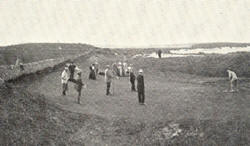 In April 1950 he moved to North Berwick on the Firth of Forth in Scotland (my childhood holiday resort) and began managing a hotel. Subsequently ran the West End Cafe in Edinburgh during the 1950s. Continued to work successfully in management, but never resumed professional playing
In April 1950 he moved to North Berwick on the Firth of Forth in Scotland (my childhood holiday resort) and began managing a hotel. Subsequently ran the West End Cafe in Edinburgh during the 1950s. Continued to work successfully in management, but never resumed professional playing
John Chilton‘s Who’s Who Of British Jazz
The Hotel. This was Westerdunes Hotel in North Berwick, East Lothian now converted to flats, with houses having been built in the large grounds. In the 1950s it was considered very nice indeed–and lots of famous people visited. But it needed a lot spent on it to modernise it for the 1970s (eg installing en suite facilities for the bedrooms). Too much to make it viable so it was sold for redevelopment. One of the guests who Pete became friendly with was Artie Shaw. They kept in touch for several years thereafter. Artie was very surprised indeed to find himself in a hotel in faraway Scotland which was run by a guy who had played guitar with Benny Goodman a few years previously! – David Chilver
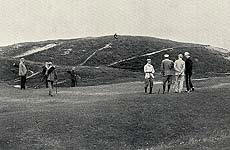
Westerdunes House was converted into a hotel by Mr. de Domenico. North Berwick as a tourist destination dates back to the 1850s when access to the town was made easier by the opening up of the railway line. During this period the number of visitors increased so dramatically that in 1871 the Town Council wrote to the Railway Company to request that the special cheap-day tickets be discontinued as the town was being over run by visitors, and there was inadequate accommodation available.
Strong indications of G Washington Browne involvement in design, Dick Peddie’s former partner. Forms 3rd of group of 3 Elizabethan Cotswold style mansions in Abbotsford Road; with closer link stylistically to the former. Garden screen bears similar gateway to Gryphon gate, Manderston, Duns, Berwickshire. Allegedly a pupil of Lutyens and Jekyll landscaped the garden. Garden seat and fountain possible from Duveen. Decorative wrought-ironwork almost certainly by Thomas Hadden. Formerly listed as Westerdunes Hotel.
In 1953, the proprietor of the Westerdunes Hotel offered to purchase the ground west of the March Dyke from the landowner. The hotel proposed to alter the layout extending the North Berwick Golf Course into the Archerfield Estate, using the land once occupied by the 9-hole Fidra golf course. These discussions were at an advanced stage before the Town Council intervened and purchased the land in January 1954 for £9,700, safeguarding the rights of the local Golf Clubs and community.
Hello Eddie, Jack Goodwin recently forwarded me your e-mail and the link to the website with the information on my Dad, Pete Chilver. Thank you so much for taking the trouble. As you may know, he stopped playing professionally in the early 1950s, but retained a very keen interest in music (and guitar players!) until the end of his life. Of course he loved Django, having known him personally and played with him–and told me a few anecdotes about those times. My mother still lives in Edinburgh and I visit her often. I now live on the Wirral and have recently retired from full time employment having (nearly ) reached the age of 60. Once again many thanks for the message–and the link to the excellent website, which I hadn’t seen before. Very best wishes, and do feel free to keep in touch – David Chilver
David’s ‘Ear’ for Jazz
I just wanted to congratulate on you on the fantastic website you’ve set up to celebrate the work and memory of Tenor man Warne Marsh. I’m 59 and live near Liverpool and have discovered Warne Marsh rather late in life . Unfortunately, therefore, I never saw him perform live. I grew up in a house with a lot of music, especially jazz as my Dad had been a professional jazz guitarist. So I got to listen and appreciate a lot of tenor players, but not Warne Marsh. My Dad knew of him but hadn’t really heard him until he went on holiday to California in the late 70s. By chance he saw Warne there with Supersax and separately with a quartet. I remember him coming back from that holiday saying what a revelation it was seeing Warne. He described him as a ‘genius’–a word he very rarely used about musicians, and among the ‘greatest of the greats’. Somehow or other, my life got in the way and I didn’t follow up my Dad’s enthusiasm by checking out Warne Marsh myself – until seeing those wonderful clips of him on YouTube. I subsequently bought the Out Of Nowhere book by Marcus Cornelius–and now I’m hooked! I haven’t found a copy of ‘Unsung Cat‘ but will keep a lookout for that.
I’m also sorry to see that so many of his recordings are out of print or only available at sky-high prices. Of those which are readily available, I’m not sure which ones I should get, so I’d really welcome any advice you might have in that regard. Once again, many congratulations on your labour of love, and very best wishes to you
Kind regards David Chilver, England. 9th. June 2010.
(David’s Dad was the late Pete Chilver, who played guitar with the Ted Heath band, George Shearing, Ralph Sharon and many others.)
